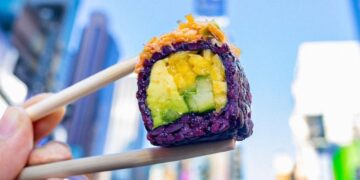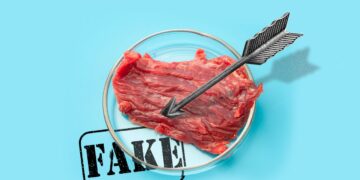[ad_1]
With few Māori within the winemaking business, and even fewer Māori ladies, Jannine Rickards is a uncommon breed. Charlotte Muru-Lanning visits her in Wairarapa.
An eye-catching bone hei matau adorns Jannine Rickard’s neck.
A fishhook symbolic of journeys which can be interwoven into journeys, it’s been worn for the final 20 years, since her father gifted it to her on her twenty first birthday.
These surprising twists and turns which have unfurled alongside the way in which have colored her personal journey, which has introduced her to the place she is now, making wine within the Wairarapa.
There are only a handful of feminine Māori winemakers within the nation, so, like her personal small-batch wine, Rickards is one thing of a uncommon breed.
She was raised additional north, in Pūkorokoro/Miranda within the Firth of Thames – close to the well-known scorching swimming pools that at the moment are closed. She grew up with dad and mom who not often drank wine and two youthful siblings on a 1,000-acre sheep and beef farm that’s now been subdivided.
After ending highschool she had a stint in Europe, then moved to Australia. It was working in eating places – and courting cooks, she says – that sparked her curiosity in wine. After a time working in hospitality in Canberra along with her then boyfriend, she got here dwelling. “I simply labored and labored for a yr after which I obtained a bit bored of it, after which I obtained bored of him.”
Rickards moved again to New Zealand and spent three months along with her dad scuba diving and serving to out on their household constitution boat. She then labored for a high quality meals importer, who additionally owned a vineyard within the Hawke’s Bay.
In 2003, she labored her first grape harvest and has been within the wine business ever since, working as an assistant winemaker at Ata Rangi in Martinborough in 2007, and later spending three years at North Canterbury’s Pegasus Bay, managing their crimson wines.
After over a decade spent abroad and transferring round Aotearoa, Rickard got here again to Wairarapa in 2017, the place she has labored as a winemaker at bio-organic winery Urlar since. That yr she additionally began her wine label, Huntress, which started with a pinot noir made with associates who run native winery On Giants’ Shoulders.
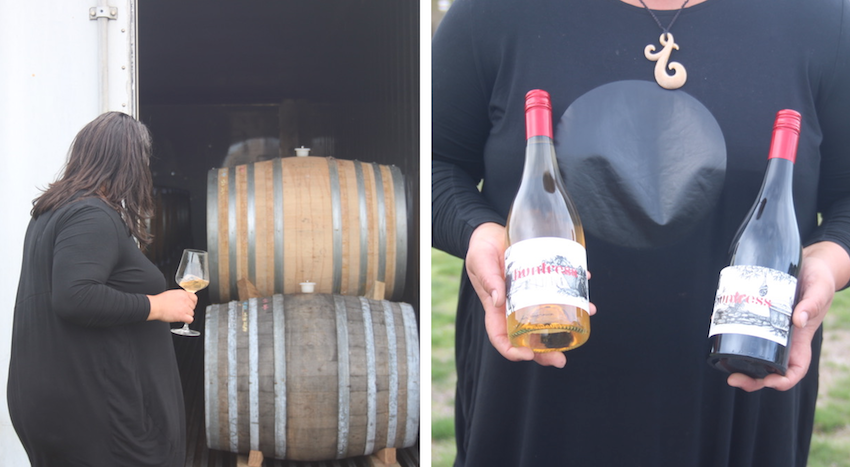
Rickards at Urlar; and with Huntress Wai Koa and pinot noir (Photographs: Charlotte Muru-Lanning)
Her model identify, Huntress, isn’t metaphorical – it’s a central a part of her life. Rickards hunts practically each weekend.
Nevertheless it wasn’t all the time so. She nearly turned vegetarian when she left hospitality. “I didn’t like the standard or the value of meat.”
On her first searching expedition a few years in the past, her brother shot a goat. “I simply cried and cried and cried and cried,” says Rickards.
It wasn’t till 2010 that she discovered a love for it when a buddy, Mick, now Rickards’ accomplice, taught her to hunt simply earlier than her thirtieth birthday. The primary time she shot one thing she remembers feeling a lump in her throat – “like when you’ll be able to’t swallow”.
“I used to be simply actually emotional and this animal was heat and I used to be sitting right here and it hit dwelling a bit,” she says.
Mick, who Rickards describes as “a grasp hunter”, taught her the butchery facet of it too. She’s captivated with utilizing all the things; hearts and liver to make pâté, bones for inventory and no matter’s left for charcuterie – when she has time.
Rickards finds a shocking sense of calmness on these expeditions. She loves the immersion and honing of senses whereas out within the bush, which make for a detailed relationship with the altering setting and seasons. There’s all the time one thing that smells fascinating. Like tī kōuka or cabbage bushes – “they odor so candy”.
She’s drawn to the method of winemaking for a similar causes. Among the many yearly routine and rituals, the seasons are ever-present and essential. For Rickards that is the fantastic thing about the job. She finds creativity throughout the change from summer time to autumn, winter to spring. “Yearly is exclusive,” she says. “You keep in mind a yr or a time in your life from the classic.”
“I really feel prefer it connects you along with your journey.”
Having that intimate understanding of the place your meals or drink comes from is central to the way in which Rickards seems on the world. A part of this has meant surrounding herself with a group of like-minded meals makers –individuals like Claire Edwards, who, alongside her accomplice Troy Bramley, runs sustainable seafood provider Tora Collective, diving for catch-to-order pāua and crayfish from a distant a part of the southern Wairarapa coast. Whereas Rickards’ and Tora’s merchandise could also be fully totally different, their philosophies run parallel.
I be part of Rickards, Edwards and Bramley on a seaweed-foraging mission and as she drives her ute out via the valleys of South Wairarapa to Tora seashore, Rickards displays on the picturesque pastoral surroundings. “I do marvel what this might have appeared like earlier than they burned all the things down for farming.”
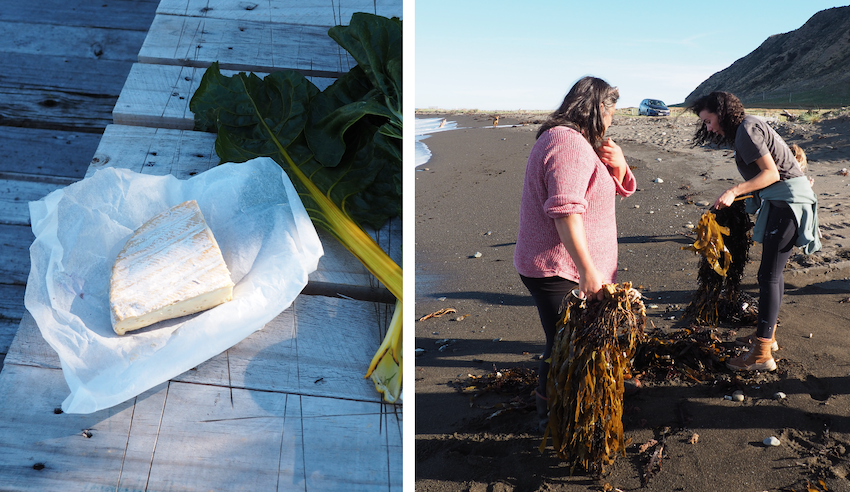
A cheese washed in Huntress pinot noir from native cheese store C’est Cheese, and Jannine Rickards and Claire Edwards gathering seaweed from Tora seashore (Photographs: Charlotte Muru-Lanning)
The comparatively quick record of eating places Rickards provides are inclined to have comparable outlooks to hers. Cazador on Auckland’s Dominion Street is a pure match – cazador means hunter in Spanish and the restaurant is legendary for serving up sport and domestically sourced kaimoana and produce.
That sense of place and provenance is an ongoing course of for Rickards and her whānau. “My connection to my Māori ancestry is one thing that I’m nonetheless journeying with,” she says.
Alongside her mum, she’s been working to slowly piece collectively their whakapapa. She is aware of she’s Ngā Puhi, she is aware of she’s Ngāi te Rangi. “I’d love to have the ability to work again to what waka we got here right here on.”
For many people who’ve grown up distant from our kāinga, marae and reo, there generally is a nervousness round sure tikanga or the pronunciation of explicit kupu. Rickards is discovering methods to reconnect via studying te reo Māori, changing into concerned in her native marae and embracing Matariki.
Final month, she was appointed to the board of Hau Ariki marae, a group marae encircled by the vineyards of Martinborough. She’s been delegated to run the kitchen workforce on explicit events. The openness of Hau Ariki has allowed these boundaries that had beforehand discouraged Rickards from being concerned on the marae to fall away. “That’s been useful for me to proceed on my journey,” she says.
“When you make a mistake, otherwise you don’t know what’s happening, you’ll get instructed.”
Whereas Rickards has for probably the most half felt supported as a Māori girl winemaker, she wonders why there stays such a putting lack of range throughout the wine business. She contemplates whether or not the taboo positioning of alcohol in te ao Māori performs a component – the most typical Māori translation for alcohol is waipiro, which interprets to stinking water – or maybe the damage alcohol has finished to Māori communities has put some off coming into the business.
On the subject of her personal product, Rickards engages with this sophisticated and fraught relationship by striving to create wines which can be an expression of place. “It’s one thing that needs to be treasured and loved, not like an alcohol that’s simply to get wasted,” she says.
What’s in your plate is as essential as what’s in your glass whenever you’re ingesting certainly one of her wines, and the intention is to pair them with native meals that’s wild or foraged. “It’s not nearly being a standalone drink.”
Her Wai Koa white, she reckons, is greatest “whereas smashing again some kaimoana”. The pinot noir, however, has a savouriness from the Wairarapa grapes that may maintain as much as gamey meats. She believes it offers wine extra depth and that means when it’s designed for meals.
And kai has all the time been essential for Rickards. Even when she was a toddler, meals was on the mind. “My dad would stand up at 5, he’d have a fast breakfast and I’d be out each morning in my highchair eyeing up my dad’s plate.”
Cookbooks clamour for house in Rickard’s kitchen – one other expression of her love for kai. She admits with fun that her ever-growing assortment inside the home Rickards and Mick constructed final yr on a block between Featherston and Martinborough is “an issue”. Nigel Slater is a favorite creator; she shares his penchant for uncomplicated cooking. Then there’s a e book by Irish prepare dinner Darina Allen, gifted by Rickard’s grandmother, which is so well-loved you’d wrongly assume she purchased it secondhand.
“I preserve shopping for them. I’m like, ‘Mick, I would like one other bookshelf’ and he’s like ‘you don’t use them’.”
“I do,” she says. “They’re inspiration.”
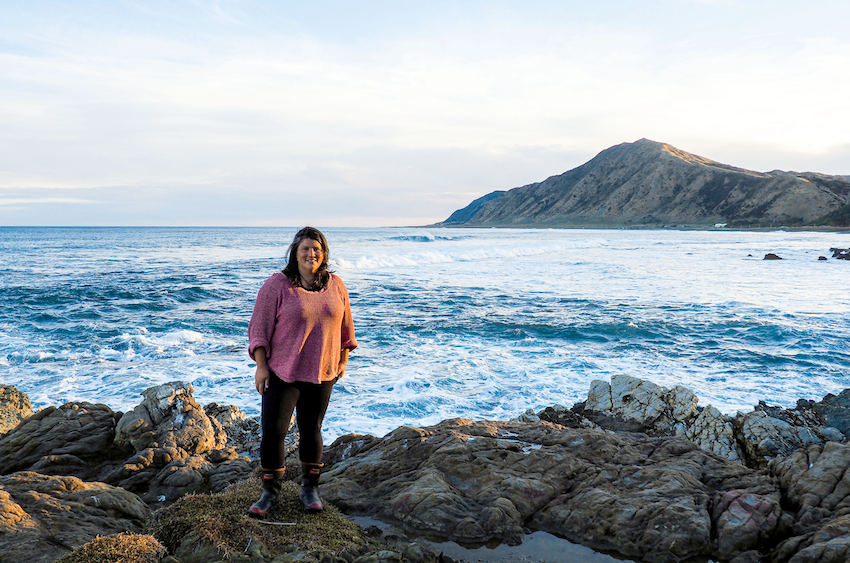
Richards at Tora, south Wairarapa (Picture: Charlotte Muru-Lanning)
Regardless of the help she’s loved as a Māori girl within the business, she thinks change is required with regards to cultural competency throughout the commerce. Pointing, for instance, to the appropriation of Māori names and imagery on wine that will get shipped abroad for export, labels that New Zealanders principally don’t see. “It’s all simply advertising and marketing ploys, the large guys making bulk wine and promoting it – it doesn’t sit effectively with me.”
She’s labored via a means of checking that the names of her personal wines are tika with educational and Hau Ariki marae committee member Kevin Haunui. “It must be applicable and accredited by somebody who truly understands the language,” she says.
As we look forward to our order on a Sunday night at a stylish meals truck in a bustling Martinborough city centre, Rickards lists off different potential tasks she may tackle. She’d prefer to develop and provide natural herbs, create a neighborhood, seasonal meals truck, a cellar door the place she will promote wine alongside her preserves and charcuterie, and, after all, she desires to maintain making wine. “The issue is I need to do all the things.”
When Rickards’ dad handed away in November final yr, she’d been busy getting ready for the harvest. Shortly afterwards, she had her fortieth birthday. “I simply sort of misplaced it,” she says, which prompted her to replicate on the quantity she’d been taking up. To take time to breathe.
This previous week, Rickards has been bottling, together with two newly launched wines. Kuratia, a calmly chilled crimson, will change the Waikura Rosé, whereas Waihōanga is a “nectar-like” skin-fermented pinot gris.
Whenever you’re a small winemaker, it’s a must to be artistic. A slight seasonal variation can imply all the things adjustments. So there’s a continuing means of studying and taking new instructions. “Wines evolve,” explains Rickards. “They’re residing issues and so they change.”
Subscribe to The Bulletin to get all of the day’s key information tales in 5 minutes – delivered each weekday at 7.30am.
[ad_2]
Source link

